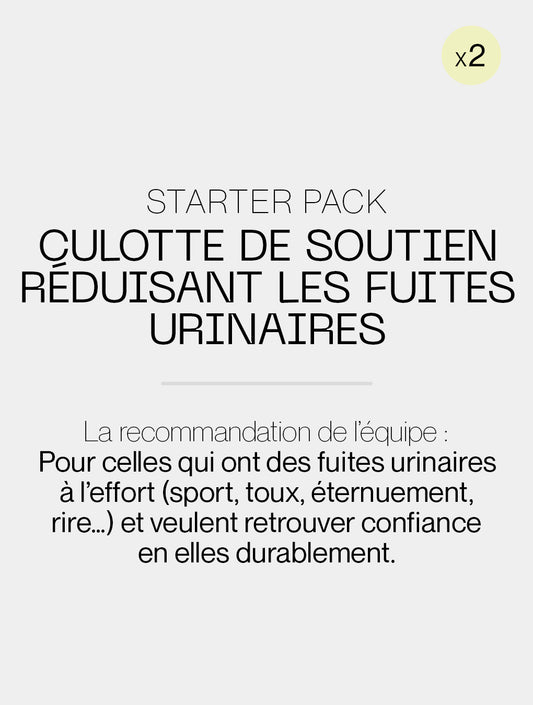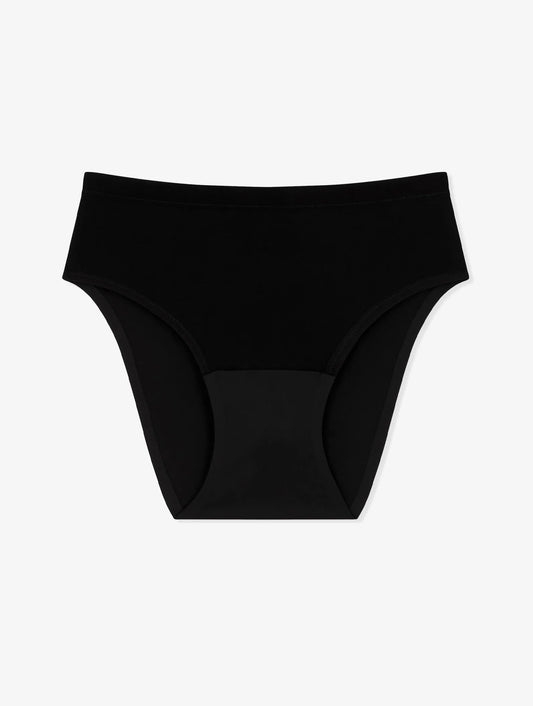Overflow incontinence, a common urinary incontinence problem, is often misunderstood. This phenomenon leads to involuntary loss of urine due to a bladder that does not empty completely.
Understanding overflow urination
Overflow urination is the result of incomplete emptying of the bladder. This phenomenon is often due to an obstacle to the flow of urine, such as a prostate condition in men or a uterine tumor in women. Urine then accumulates in the bladder which, being too full, empties drop by drop. Certain medications can also be involved, causing bladder distension.
Do you know the definition of incontinence ? Well, this type of incontinence can lead to unexpected urinary leakage, which usually occurs during the day and sometimes at night. Their frequency and volume can vary, leading to a significant total loss of urine.
It should be noted that overflow urination should not be confused with other types of abnormal urination, such as stress incontinence, which occurs during physical activities and is more common in women.
Against urinary leakage: comfortable, suitable and ecological panties
Panties suitable for urinary leakage are a practical and comfortable solution for managing overflow urination on a daily basis. These specific underwear, like menstrual panties , have the particularity of being ultra-absorbent thanks to their multiple layers of protection . They are designed to offer optimal comfort, while guaranteeing total discretion.
Focus on overflow urination
Definition of overflow urination
Overflow urination is defined as leaking urine related to chronic retention of urine . This condition occurs when the bladder does not empty completely during urination, causing a buildup of urine that eventually leaks out. Often the volume of this leak is small but constant, resulting in losses of significant total volume.
They are sometimes associated with urination in two stages, a feeling of incomplete emptying or delayed drips . These signs may reflect bladder dysfunction or an obstacle to the flow of urine, such as a stricture of the urethra or prostate pathology in men.
It is essential to mention that overflow urination differs from stress incontinence or urge incontinence, which have distinct causes and symptoms such as peeing after coughing .
Causes of overflow urination
The causes of overflow urination are diverse and multifactorial.
-
One of the main causes is obstruction of the passage of urine . This may be due to a prostate condition in men, or a uterine tumor in women.
-
Neurological disorders such as Parkinson's disease or spinal cord injuries may also be a cause. These conditions can affect the nerves that control the bladder and disrupt its ability to empty completely.
-
Finally, certain medications can cause bladder distention, contributing to urinary leakage. It is therefore essential to inform your doctor of any medication taken regularly.
Symptoms of overflow urination
Symptoms of overflow urination can vary from person to person. The most common include:
- Constant urinary leaks : Overflow incontinence is characterized by small, continuous leaks of urine throughout the day.
- Feeling of incomplete emptying : After urination, it may feel like the bladder is not completely emptied.
- Frequent urination : The need to urinate may be more frequent than normal, even at night.
It is also possible to experience other symptoms, such as:
- Two-stage urination : You may need to urinate a second time shortly after emptying your bladder.
- Slow, long urination : Urinary flow may be weak and require effort to urinate.
- Delayed drops : After urinating, a few drops of urine may still flow.
These symptoms may reflect bladder dysfunction or an obstruction to the flow of urine. It is therefore essential to consult a healthcare professional for an accurate diagnosis.

Overflowing urination in women
Risk factors in women
Among the risk factors for overflow urination in women, some are linked to specific medical conditions. For example, uterine tumors or fibroids can cause obstruction, leading to urinary leakage. Additionally, chronic constipation , by compressing the urethra, can also cause this type of incontinence.
Obstetric trauma must also be considered, as do the hormonal consequences of menopause which can affect bladder function. In particular, estrogen deficiency can increase urethral neck rigidity and reduce bladder compliance.
Some women may also be prone to overflow urination due to urinary retention , often caused by dementia or neurological disorders.
In all cases, it is crucial to consult a health professional for an accurate diagnosis and appropriate treatment against incontinence .
Treatment of overflow urination in women
To treat overflow urination in women, several options are available. First, perineal rehabilitation is often proposed as first intention. It helps strengthen the muscles of the perineum and improve bladder control. Physiotherapy sessions may be necessary to learn the appropriate exercises.
In some cases, drug treatment may be considered, particularly when overflow urination is linked to a specific condition such as multiple sclerosis.
Finally, surgical intervention may be necessary in the most severe cases, for example when the obstacle to the flow of urine is due to a tumor . However, this option remains the last resort, after failure of other treatments.
In all cases, it is essential to consult a health professional (general practitioner, urologist, gynecologist) to benefit from a precise diagnosis and appropriate treatment.
Overflow urination in men
Role of the prostate in overflow urination
In men, the prostate plays a central role in overflow urination. Located around the urethra, this gland can, in the event of benign enlargement or cancer, obstruct the passage of urine and cause retention. This retention then increases the pressure in the bladder, causing constant leaking of urine. This phenomenon is particularly common in older men, where benign prostatic hypertrophy is a common condition. Signs of this form of incontinence may include burning when urinating or hematuria if there is associated prostatitis. Finally, urination problems can be a warning sign of a prostate pathology requiring medical treatment.
Treatment of overflow urination in men
The treatment of overflow urination in men is based on several options. The drug approach includes the use of alpha-antagonists and 5alpha-reductase inhibitors to relieve bladder obstruction. These medications work by relaxing the muscles of the prostate and bladder to make urine flow easier. In some cases, intermittent or permanent urinary catheterization may be performed to help empty the bladder.
When these approaches fail or are not appropriate, surgical interventions may be considered. These procedures aim to remove the obstacle that prevents the bladder from emptying properly. For example, endoscopic prostate resection is often used in cases of benign prostatic hyperplasia. Other emerging techniques, such as Urolift® or prostate embolization, may also be an option.
It is essential to discuss the treatment options available with your doctor to choose the one best suited to your situation and needs.
Overflow urination: how to manage daily urine loss?
Tips to avoid urinary leakage in case of overflow urination
To minimize urinary leakage due to overflow urination, several tips can be adopted:
- Schedule urination : Do not wait until you have an urge to urinate. Make it a habit to empty your bladder at regular intervals.
- Kegel exercises : These pelvic floor strengthening exercises can help improve bladder control.
- Weight management : Being overweight can put extra pressure on the bladder. A balanced diet and exercise can help maintain a healthy weight.
- Avoid constipation : It can put pressure on the bladder and worsen urinary leakage. A diet rich in fiber, such as eating figs, can help prevent constipation.
- Use urinary protection : These can help manage urinary leakage and protect your clothes.
What are the bad habits of overflow urination?
Bad overflow urination habits can lead to a series of complications. They include urination in two stages, a persistent feeling of an unemptied bladder and delayed drips. Additionally, overflow urination can result in constant incontinence, leading to social discomfort and restriction of social behavior.
Certain habits can make the problem worse. For example, forced or prolonged urination, often observed as a warning symptom, can worsen bladder obstruction if done regularly. Likewise, failure to respect the recommended urination intervals (generally between 3 to 4 hours) can increase urinary retention.
It is therefore crucial to identify and correct these bad habits to improve the management of overflow urination. For this, consultation with a health professional (general practitioner, urologist, physiotherapist) is strongly recommended.
Bladder that does not empty and urination by overflow: what is the link?
There Overflow urination is closely linked to a bladder that does not empty completely. Indeed, when the bladder is overfilled and does not empty completely, urine can begin to flow drop by drop, a phenomenon called overflow.
Several factors may be involved, including certain medications that distend the bladder, poor bladder muscle contractions, or a blockage of the bladder opening (bladder neck obstruction).
In addition, a bladder that does not empty completely can encourage the development of bacteria and therefore recurrent urinary infections . Also, in the event of long-neglected retention, the bladder may even become distended. It is therefore essential to consult a health professional in the event of suggestive symptoms.
Medical treatment of overflow urination
Medicines to treat overflow urination
For the treatment of overflow urination, several medications are available. Alpha-antagonists and 5alpha-reductase inhibitors are commonly used to relieve bladder obstruction, especially in men with prostate problems.
Certain medications, such as antidepressants, anticholinergics, calcium channel blockers, antipsychotics, and opioids, can affect bladder contractions. It is therefore essential to inform your doctor of any regular medication.
Surgery for overflow urination: when is it considered?
Surgery for overflow urination is usually considered when other types of treatment, such as medications or bladder training exercises, have not sufficiently improved the situation.
This is often a last resort option, considered in cases of significant urethral obstruction or tumor. In practice, the decision to opt for surgery is taken in consultation between the patient and his doctor , after a detailed assessment of the clinical situation and the patient's quality of life.
How to improve your quality of life with overflow urination?
Nutritional Tips to Reduce Overflow Urination
To reduce overflow urination, a suitable nutritional approach can be very beneficial.
- Moderate hydration : Limit your fluid intake to around 1.5 liters per day to avoid bladder overload.
- Reduction of irritants : Foods and drinks such as coffee, tea, spices and alcohol can increase irritability of the bladder and urethra. It is therefore advisable to consume them in moderation.
- Protein control : Excessive protein consumption can harm the kidneys and increase urine production. The recommended intake is approximately 0.8 g/kg/day.
- Balanced diet : Eat at least 5 fruits and vegetables per day for optimal intake of vitamins and minerals, and remember to include at least one complete starch in your daily diet.
Adopting these dietary tips can help better manage overflow urination. However, as each individual is different, it is recommended to consult a healthcare professional for advice tailored to your situation.
Bladder rehabilitation exercises
Bladder rehabilitation is a valuable tool for managing overflow urination. It includes several techniques to improve bladder control.
-
Timed urination involves urinating at regular intervals, usually every 2 to 3 hours, to reduce leaking.
-
Kegel exercises strengthen the pelvic floor muscles, helping to control urination. They must be practiced regularly for several months to be effective.
-
Electrotherapy and biofeedback are also commonly used methods to complement bladder rehabilitation.
These techniques can be learned from health professionals, such as physiotherapists or midwives. A personalized program can be put in place, adapted to the individual situation of each patient.
Management of stress and overflow urination
Stress management can play a crucial role in managing overflow urination. Stress can actually exacerbate incontinence symptoms and make bladder management more difficult. Several techniques can help reduce stress and therefore excessive urination, such as meditation, relaxation or regular exercise.
Adopting a balanced diet, rich in fruits and vegetables, and limiting the consumption of caffeine and alcohol can also contribute to better stress management.
Recommended practices:
- Relaxation techniques: yoga, sophrology, deep breathing
- Regular physical activities
- Balanced diet
- Sufficient hydration
It is recommended to discuss these techniques with a healthcare professional to choose those that are best suited to your situation.
The role of healthcare professionals in the treatment of overflow urination
Healthcare professionals play a key role in treating overflow urination. They are the first to assess symptoms, make a diagnosis and suggest a treatment plan.
The role of these professionals goes beyond medical prescription. They provide advice on lifestyle modifications and stress management techniques, assist in implementing bladder rehabilitation exercise programs, and support the patient in managing treatment side effects. This support can involve different types of health professionals:
- General practitioners : They are often the first point of contact for patients with symptoms of incontinence. They can assess symptoms, order initial diagnostic tests, and refer the patient to a urologist if necessary.
- Urologists : They are specialists in diseases of the urinary system. They are responsible for developing a detailed treatment plan, which may include medications, bladder retraining exercises, or even surgery.
- Physical therapists : They can help implement bladder retraining exercise programs, such as Kegel exercises, designed to strengthen the muscles that control urination.
- Pharmacists : They play a crucial role in managing the side effects of medications prescribed for the treatment of overflow urination. They can also provide advice on lifestyle changes that can help manage symptoms.
In short, a multidisciplinary approach involving different health professionals is often necessary for optimal management of overflow urination.
Testimonials from people living with overflow urination
Stories from people living with overflow urination offer insight into daily challenges and coping strategies for this condition.
- Jessica , who has suffered from kidney failure since the age of 13, discusses the importance of appropriate medical care and regular monitoring to manage the symptoms associated with her disease, including excessive urination.
Other testimonies highlight the significant impact of overflow urination on the quality of daily life, particularly due to constant urinary leakage.




